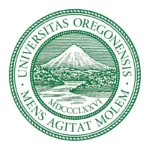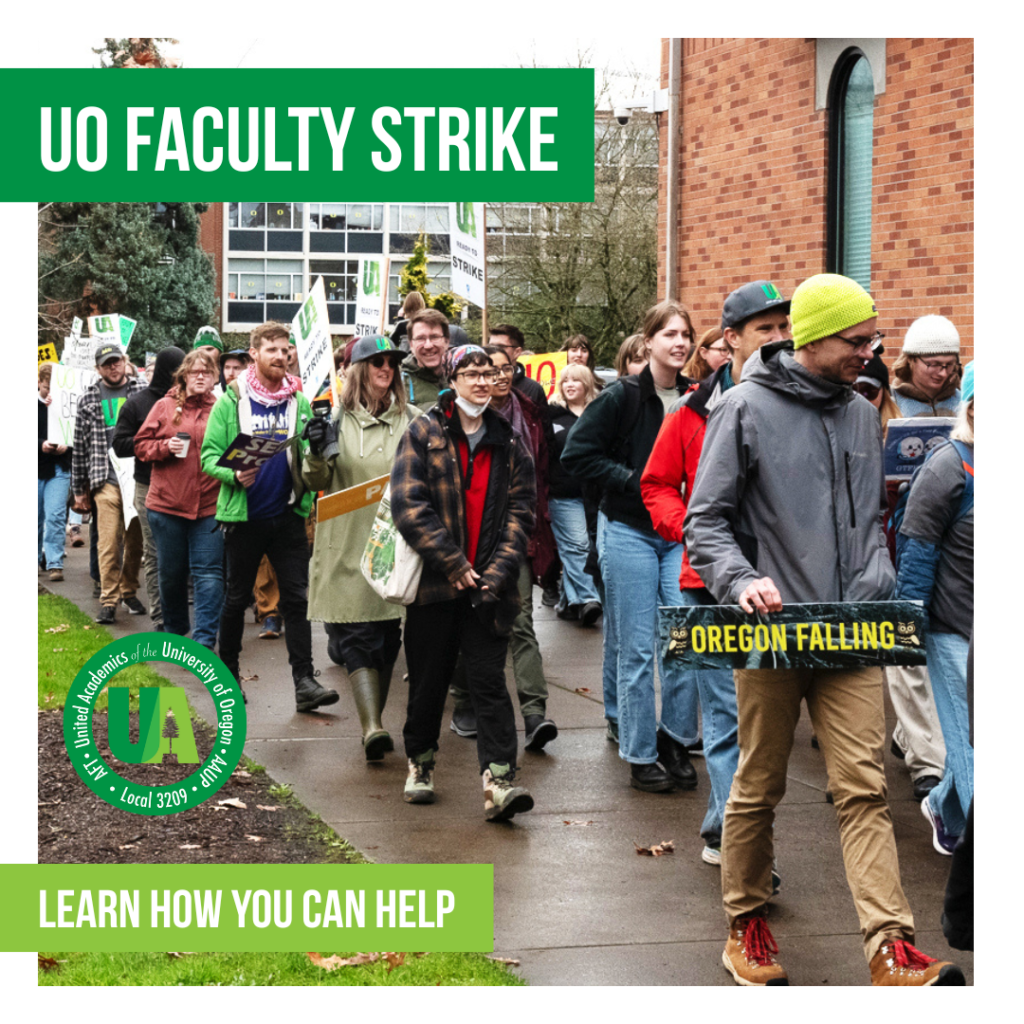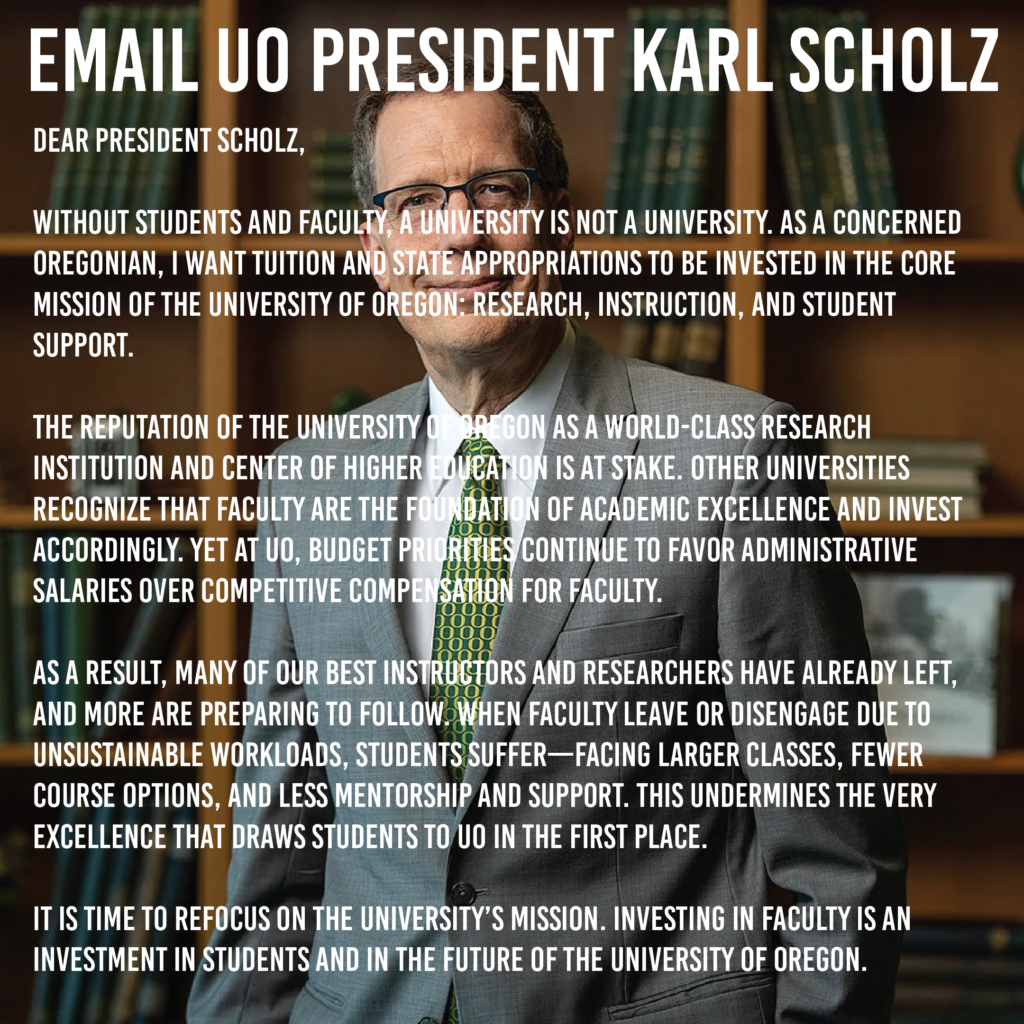Help Faculty Win a Just Contract
There are a lot of ways Oregonians can help the faculty at the University of Oregon win a just contract. Join us for a big community rally, join us on social media, and email UO President Karl Scholz and ask why there is money for administrators but not for faculty.
Support the Mission of the University of Oregon
Tuition has increased faster than inflation. State funding has increased faster than inflation. Administrator salaries have increased faster than inflation. Yet, the administration is demanding that the teachers, librarians, and researchers who drive the university’s educational mission take real wage cuts.
While everyone acknowledges the financial challenges facing higher education, the UO is receiving more money per student than ever before. If this money isn’t going toward student education and knowledge creation, where is it going?
The Facts:
Quality Education Requires Investment in Faculty
The value of a University of Oregon degree depends on the quality of its professors, instructors, researchers, and librarians. When faculty wages erode due to artificial austerity, neglect, or slow attrition, it affects not only the quality of education and research, but also the long-term value of a UO degree for students and alumni alike.

- UO faculty salaries rank near the bottom among our peer institutions in the American Association of Universities (AAU).
- United Academics has proposed fair wage increases that would merely adjust salaries for inflation and restore them to pre-pandemic budget levels.
- Despite pandemic-related learning loss, the administration is spending less on education per student (adjusted for inflation) than before COVID-19.
- The administration has prioritized administrative growth over academic excellence, while faculty have taken on increased workloads since the pandemic.
Faculty Sacrificed to Protect UO—Now It’s Time for Fair Wages
During the pandemic, faculty agreed to potential pay reductions to help UO weather an uncertain financial future. We made sacrifices to ensure the university could continue to serve students. Now, as we bargain our first post-pandemic contract, the administration refuses to offer wage increases that:
- Cover inflation
- Acknowledge additional faculty labor since the pandemic
- Recognize our unwavering commitment to UO’s educational mission
Our Vision for UO: Excellence in Teaching & Research
The University of Oregon’s mission is clear:
“The University of Oregon is a comprehensive public research university committed to exceptional teaching, discovery, and service. We work at a human scale to generate big ideas. As a community of scholars, we help individuals question critically, think logically, reason effectively, communicate clearly, act creatively, and live ethically.”
Our vision for the University of Oregon is one where the educational and research mission are at the fore; an institution of higher learning where we attract and maintain the best researchers and instructors and provide a world class education for the citizens of Oregon and beyond. Yes, this will take a shift in economic priorities, but only back to those before the pandemic. Our demands are neither extravagant nor frivolous. Our demand is that the fiduciaries of the University of Oregon perform their primary fiduciary duty: support the mission of the University of Oregon.
Why This Matters Now
We are currently in state-mandated mediation, a final step before a potential faculty strike. Striking is a last resort—faculty do not want to disrupt student learning. However, the administration’s arguments for austerity do not align with the university’s financial situation or acknowledge the increased faculty labor and inflated economic reality since the pandemic. If the administration does not relent, we may have no choice but to strike.
We Need Your Support
A strong show of support from the UO community—students, parents, alumni, donors, legislators and citizens of Oregon and beyond—can help pressure the administration to do the right thing.
More Information
- Include new UO faculty in salary increases
 The UO administration is currently proposing that new faculty not receive any raises in year one of the new contract. Our potential exclusion from this raise would exacerbate ongoing pay …
The UO administration is currently proposing that new faculty not receive any raises in year one of the new contract. Our potential exclusion from this raise would exacerbate ongoing pay … - What Happens If Faculty Strike?
 If faculty strike, all work done by professors, instructors, librarians, and researchers will stop. Emails will not be responded to, and classes will not run (though the administration may try …
If faculty strike, all work done by professors, instructors, librarians, and researchers will stop. Emails will not be responded to, and classes will not run (though the administration may try … - How Administrators Manipulate Budgets to Create Fake Deficits
 Much of this information is from an article in the student newspaper, the Daily Emerald. The administration is claiming a deficit because out-of-state enrollment did not meet targets. Let’s look …
Much of this information is from an article in the student newspaper, the Daily Emerald. The administration is claiming a deficit because out-of-state enrollment did not meet targets. Let’s look … - A Choice to Move Resources from the Mission
 The Education and General, or simply E&G budget, is the “bucket” of money which goes to the core mission of the university. This is funded by tuition and state funding. …
The Education and General, or simply E&G budget, is the “bucket” of money which goes to the core mission of the university. This is funded by tuition and state funding. … - Eroding Competitiveness
 The University of Oregon is a member of the American Association of Universities (AAU), a consortium of highly ranked research universities. These are our peers, the institutions with which we …
The University of Oregon is a member of the American Association of Universities (AAU), a consortium of highly ranked research universities. These are our peers, the institutions with which we …
Links & Media Coverage
- uauoregon.org
- UA’s newsletter
- KEZI, 2/19/25
- Daily Emerald, 2/24/25
- Daily Emerald, 2/19/25
- Daily Emerald, 2/11/25
- Daily Emerald, 2/10/25
- Register-Guard, 2/2/25
- Daily Emerald, 1/27/25
- Daily Emerald, 1/7/25
- KLCC, 12/6/24
- Daily Emerald, 12/5/24
- Daily Emerald, 12/2/24
- KTVL, 11/14/24
- KMTR, 11/14/24
- Eugene Weekly, 11/14/24
- Daily Emerald, 11/13/24
- Eugene Weekly, 11/12/24
FAQ
What is United Academics?
We are the representative of the faculty at the University of Oregon. We are a union affiliated with the American Association of University Professors and the American Federation of Teachers. We promote and defend quality public higher education by working together to uphold the University of Oregon’s academic and research priorities.
Bargaining? Mediation? What is going on?
Every three years we bargain a new collective bargaining agreement; a contract with the university which specifies expectations, benefits, pay etc. We have been bargaining with the administration since Spring and the administration has called for mediation–a state mandated part of the process for when negotiations break down.
If we cannot reach agreement during mediation, the members of United Academics may vote to authorize a strike. During a strike all labor by members stops, but negotiations continue until an agreement can be reached.
But the UO says it’s broke!
With rising tuition, rising state appropriations and a rising Education & General budget, it is hard to argue the UO is broke. Their financial position is better than ever. Have they overextended themselves by prioritizing administrators and administrative pay? Perhaps, but that is different than being broke.
Our asks can be achieved by restoring the percentage of tuition and state funds which go to faculty back to their pre pandemic levels.
But UO says their biggest expense is personnel. Where else are they going to make up the deficit?
If you’re a little short on funds one month do you A) just pay less on your mortgage this month! or B) Cut back on your fun budget?
Also, They’re a little short because they purposefully overestimated their income and then went on a shopping spree with money they didn’t have.
A strike? That sounds inconvenient.
Right? At this point, we do not know if we will be forced to strike. That will take a vote of our membership.
We would rather arrive at a fair contract at the bargaining table, with a minimal amount of disruption. However, we have heard unequivocally from our members that they are not satisfied with real pay cuts, especially in light of growing UO revenue. If the administration does not divert course we may be forced to strike.
This is why we are appealing to you now. With enough pressure from UO constituencies, we hope to avert the need for a strike.
Tuition is rising, how can you ask for more for yourself?
Tuition is rising. In the late 20th Century states divested from higher education, and the vacuum was filled by a corporate attitude where the price of higher education is calculated not as a public good, but as a commodity. Tuition is maximized for revenue, not value.
Currently a lower and lower proportion of tuition dollars are going to faculty salaries.
But the solution to whatever budget crisis the administration is claiming, cannot be to devalue the profession of higher education to the point where smart, ambitious, engaged people do not want to go into it. The education of future students depends on the maintenance of the profession.
Our ask is not extreme. A return to the pre pandemic proportion of the UO Education & General budget going to faculty.
Where are you getting your numbers?
UO is required to release certain financial data to the public on their Institutional Research website. This includes information for salaries, demographics, etc. Information about budgets and projections is found on the UO Business Affairs website. Some information about salaries of our comparators can be found in the annual Faculty Compensation Survey by the American Association of University Professors. Information about student enrollment is from UO Student Services and Enrollment Management.
We have done our best to provide accurate numbers and projections. However, UO purposefully makes it difficult to analyze the data they provide (for instance by using dashboards or providing data via pdf instead of in a spreadsheet), and so some numbers are necessarily estimates. As we get information to provide better estimates and projections we will update this page.




